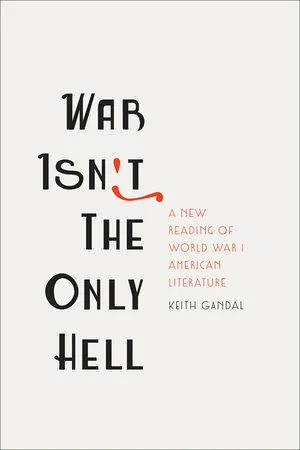
- English
- ePUB (mobile friendly)
- Available on iOS & Android
About this book
A vigorous reappraisal of American literature inspired by the First World War.
American World War I literature has long been interpreted as an alienated outcry against modern warfare and government propaganda. This prevailing reading ignores the US army's unprecedented attempt during World War I to assign men—except, notoriously, African Americans—to positions and ranks based on merit. And it misses the fact that the culture granted masculinity only to combatants, while the noncombatant majority of doughboys experienced a different alienation: that of shame.
Drawing on military archives, current research by social-military historians, and his own readings of thirteen major writers, Keith Gandal seeks to put American literature written after the Great War in its proper context—as a response to the shocks of war and meritocracy. The supposedly antiwar texts of noncombatant Lost Generation authors Dos Passos, Hemingway, Fitzgerald, Cummings, and Faulkner addressed—often in coded ways—the noncombatant failure to measure up.
Gandal also examines combat-soldier writers William March, Thomas Boyd, Laurence Stallings, and Hervey Allen. Their works are considered straight-forward antiwar narratives, but they are in addition shaped by experiences of meritocratic recognition, especially meaningful for socially disadvantaged men. Gandal furthermore contextualizes the sole World War I novel by an African American veteran, Victor Daly, revealing a complex experience of both army discrimination and empowerment among the French. Finally, Gandal explores three women writers—Katherine Anne Porter, Willa Cather, and Ellen La Motte—who saw the war create frontline opportunities for women while allowing them to be arbiters of masculinity at home. Ultimately, War Isn't the Only Hell shows how American World War I literature registered the profound ways in which new military practices and a foreign war unsettled traditional American hierarchies of class, ethnicity, gender, and even race.
Frequently asked questions
- Essential is ideal for learners and professionals who enjoy exploring a wide range of subjects. Access the Essential Library with 800,000+ trusted titles and best-sellers across business, personal growth, and the humanities. Includes unlimited reading time and Standard Read Aloud voice.
- Complete: Perfect for advanced learners and researchers needing full, unrestricted access. Unlock 1.4M+ books across hundreds of subjects, including academic and specialized titles. The Complete Plan also includes advanced features like Premium Read Aloud and Research Assistant.
Please note we cannot support devices running on iOS 13 and Android 7 or earlier. Learn more about using the app.
Information
Table of contents
- Cover Page
- Title Page
- Copyright Page
- Dedication
- Epigraph
- Contents
- Acknowledgments
- Introduction: The Shock of War and Meritocracy
- Part One: War Literature by Noncombatant Males
- Part Two: War Literature by Female Participants and Nonparticipants
- Part Three: Combatant War Literature
- Conclusion: War and Meritocracy Literature
- Notes
- Index